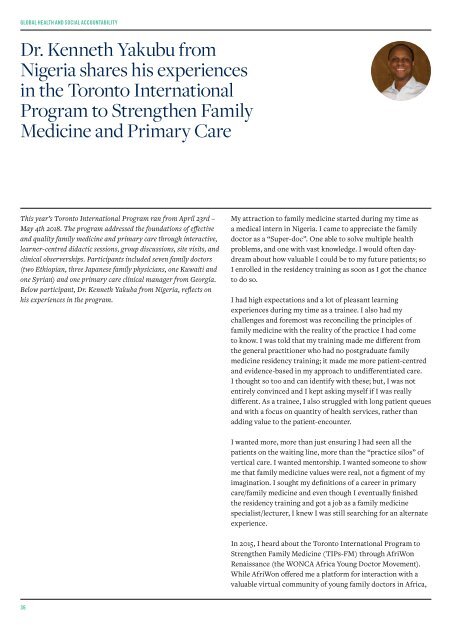DFCM Annual Report 2017-2018
You also want an ePaper? Increase the reach of your titles
YUMPU automatically turns print PDFs into web optimized ePapers that Google loves.
GLOBAL HEALTH AND SOCIAL ACCOUNTABILITY<br />
Dr. Kenneth Yakubu from<br />
Nigeria shares his experiences<br />
in the Toronto International<br />
Program to Strengthen Family<br />
Medicine and Primary Care<br />
This year’s Toronto International Program ran from April 23rd –<br />
May 4th <strong>2018</strong>. The program addressed the foundations of effective<br />
and quality family medicine and primary care through interactive,<br />
learner-centred didactic sessions, group discussions, site visits, and<br />
clinical observerships. Participants included seven family doctors<br />
(two Ethiopian, three Japanese family physicians, one Kuwaiti and<br />
one Syrian) and one primary care clinical manager from Georgia.<br />
Below participant, Dr. Kenneth Yakuba from Nigeria, reflects on<br />
his experiences in the program.<br />
My attraction to family medicine started during my time as<br />
a medical intern in Nigeria. I came to appreciate the family<br />
doctor as a “Super-doc”. One able to solve multiple health<br />
problems, and one with vast knowledge. I would often daydream<br />
about how valuable I could be to my future patients; so<br />
I enrolled in the residency training as soon as I got the chance<br />
to do so.<br />
I had high expectations and a lot of pleasant learning<br />
experiences during my time as a trainee. I also had my<br />
challenges and foremost was reconciling the principles of<br />
family medicine with the reality of the practice I had come<br />
to know. I was told that my training made me different from<br />
the general practitioner who had no postgraduate family<br />
medicine residency training; it made me more patient-centred<br />
and evidence-based in my approach to undifferentiated care.<br />
I thought so too and can identify with these; but, I was not<br />
entirely convinced and I kept asking myself if I was really<br />
different. As a trainee, I also struggled with long patient queues<br />
and with a focus on quantity of health services, rather than<br />
adding value to the patient-encounter.<br />
I wanted more, more than just ensuring I had seen all the<br />
patients on the waiting line, more than the “practice silos” of<br />
vertical care. I wanted mentorship. I wanted someone to show<br />
me that family medicine values were real, not a figment of my<br />
imagination. I sought my definitions of a career in primary<br />
care/family medicine and even though I eventually finished<br />
the residency training and got a job as a family medicine<br />
specialist/lecturer, I knew I was still searching for an alternate<br />
experience.<br />
In 2015, I heard about the Toronto International Program to<br />
Strengthen Family Medicine (TIPs-FM) through AfriWon<br />
Renaissance (the WONCA Africa Young Doctor Movement).<br />
While AfriWon offered me a platform for interaction with a<br />
valuable virtual community of young family doctors in Africa,<br />
36


